Expat magazines come and go, but while they last they're pretty interesting.
Consider Compass, which started life as a folded piece of paper and now publishes three monthly entertainment guides. Or 24seven, which until a management change last year did not shirk from publishing nudity, profanity and articles with headlines like I'm Addicted to Hookers.
One of the latest and more eclectic of the genre is Xpat Magazine, which bills itself as "a low-cost entertaining magazine for those of us who are hungry for fresh writing and unique perspectives in this literature-starved nation." The English-only magazine is the brainchild of Matt Gibson, a 27-year-old Canadian who teaches English in Tainan.
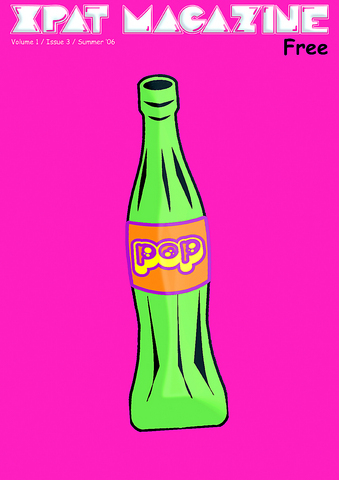
"I figured there were enough artists and dropout writers floating around the island," Gibson said in a phone interview last Thursday. "Most of the people who come to Taiwan (to teach English) have liberal arts degrees."
Among the stories in Xpat's summer issue are a primer on graffiti in Taiwan, a survey of Internet porn and a photo essay on the Yenshui fireworks festival (鹽水蜂炮). Highlights from previous issues include a photojournalist's account of a week spent with street kids in Kathmandu and a photo essay on spirit mediums in southern Taiwan.
Each 50-page issue focuses on a specific theme and is published in full color, with lavish layout spreads that are intended to be works of art in and of themselves. Xpat also publishes fiction and informational stories on topics such as "How You Should Have Prepared for Chinese New Year." Those interested in submitting stories to Xpat can contact Gibson at xpatmag@gmail.com. Back issues and additional content are available on the Web at www.xpatmag.com.
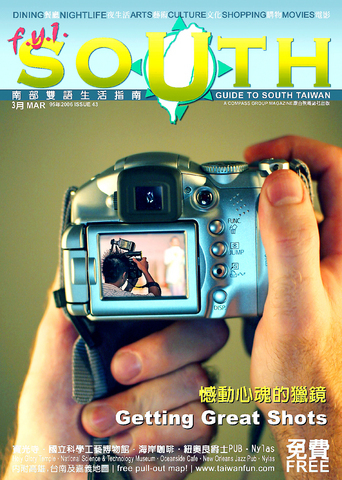
ALL PHOTOS COURTESY OF PUBLISHERS
"We try to get a broad audience of expats, from the just-arrived to the old-timers," said Gibson, who spends about 40 hours a week working on his magazine. "I try to keep it entertaining with some of the lowbrow humor, but we also publish more intellectual stuff."
Xpat launched in December with 4,000 copies distributed at foreigner hangouts in Taichung, Tainan, Chiayi and Kaohsiung. The next issue will be published in the first week of September.
Feedback has been, for the most part, "very good," Gibson said. Criticism has focused on some writers' negative comments about Taiwan. "There has been a tendency for people to vent about Taiwan in the magazine," Gibson said, but he added that he couldn't be picky about content when he doesn't pay his writers.
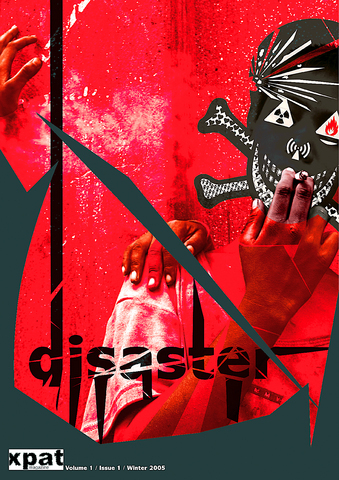
Like Xpat, most magazines run by foreigners are theme-based and do not pay for content. For writers living on the east coast, there's Hualien-based bilingual monthly Highway 11, which founder Ryan St. Onge said is "a travel magazine geared towards tourists but with content interesting enough that people living here would also find it informative." Copies of the 24-page magazine, which publishes 4,000 copies a month, can be found at train stations, restaurants and hotels from Taidung to Taipei. For submissions, send an e-mail to stongerp@yahoo.ca.
"There's very little in Chinese and less than nothing in English in the way of reading material on the east coast," St. Onge said. "There needed to be some sort of voice for it."
24seven started in Taichung and targets a younger, English-speaking demographic with themes like "Get With the Program" and "Propaganda." It now publishes 5,000 copies a month and is based in Taipei, where it has partnered with entertainment portal www.taiwannights.com. For submissions, send an e-mail to submit@24seventaiwan.com.
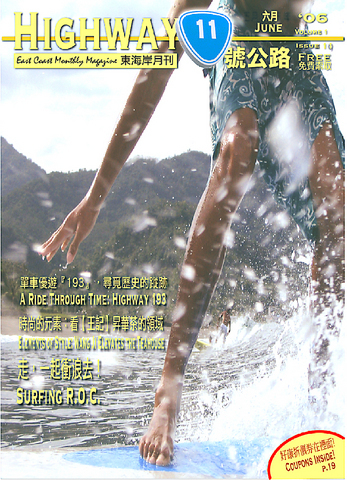
"We're set on making it a viable business opportunity," publisher Reese Richards said.
Taichung Voice, which celebrated its second anniversary last week, is topics-oriented and publishes 2,000 bilingual issues each month. Next month's theme will be animals. For submissions, send an e-mail to editor@thetaichungvoice.com.
"What we're ultimately trying to do is help the expats learn about the Taiwanese and Taiwanese culture, and shed some light on the expat culture to the Taiwanese," said publisher Lance Carroll.
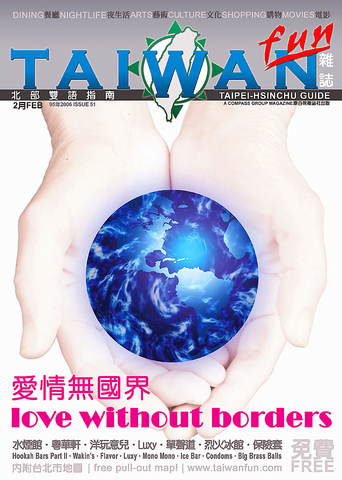
Taiwan's English-language literary journal, Pressed, which also operates out of Taichung, is still accepting stories for its September issue. Pressed publishes 3,500 copies twice a year and relies on donations, not advertisements. For submissions, e-mail pressed@asia.com.
"The freedom that people have here is overwhelming, but the people who actually take advantage of it are few and far between," said publisher Joel McCaffrey. "We're trying to network those people."
Will these magazines become lasting insti-tutions? Publishers said they either plan on sticking it out or making their magazines viable after they've left, but similar operations have come and gone. Taipei-based That (
"This business has a very high turnover rate," said Courtney Donovan Smith, co-publisher of the Compass Group of Media Properties. "It's a very capital-intensive business with low margins, and it takes quite a while to build a good solid readership base."
Compass started in 1994 as a newsletter for Taichung's American Chamber of Commerce. The company separated in 1998 and now publishes monthly bilingual entertainment guides for the Taichung area (Compass), the south (FYI South) and Taipei (Taiwan Fun). Each issue has a print run of 30,000 to 50,000 copies and most readers are Taiwanese. The Web site, www.taiwanfun.com, generated around 1.5 million to 2 million page views last month.
Smith said that an expat magazine can survive indefinitely as long as it maintains a small print run, does not pay for content and if its publishers are willing to occasionally lose money. "When you keep your scale small, it's not such a big deal. But once you get to a certain stage then you need to worry about all the taxes and legal issues." Publishing in Chinese attracts the attention of the authorities, and Compass publishers think twice about publishing stories that mention alcohol, tobacco products or make anything that can be construed as a health claim.
It wasn't until 2000 that Compass grew large enough to enable the company to hire staff. They now employ a dozen, in addition to 30 to 50 freelance translators, writers and photographers.
How did they survive? "Probably because we're stupid. Basically we just stuck with it," Smith said.

The Directorate-General of Budget, Accounting and Statistics (DGBAS) told legislators last week that because the Chinese Nationalist Party (KMT) and Taiwan People’s Party (TPP) are continuing to block next year’s budget from passing, the nation could lose 1.5 percent of its GDP growth next year. According to the DGBAS report, officials presented to the legislature, the 2026 budget proposal includes NT$299.2 billion in funding for new projects and funding increases for various government functions. This funding only becomes available when the legislature approves it. The DGBAS estimates that every NT$10 billion in government money not spent shaves 0.05 percent off
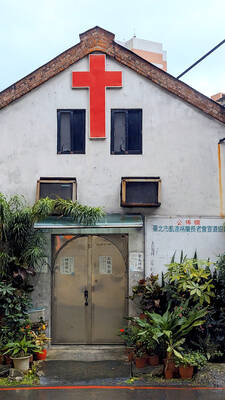
Dec. 29 to Jan. 4 Like the Taoist Baode Temple (保德宮) featured in last week’s column, there’s little at first glance to suggest that Taipei’s Independence Presbyterian Church in Xinbeitou (自立長老會新北投教會) has Indigenous roots. One hint is a small sign on the facade reading “Ketagalan Presbyterian Mission Association” — Ketagalan being an collective term for the Pingpu (plains Indigenous) groups who once inhabited much of northern Taiwan. Inside, a display on the back wall introduces the congregation’s founder Pan Shui-tu (潘水土), a member of the Pingpu settlement of Kipatauw, and provides information about the Ketagalan and their early involvement with Christianity. Most

The People’s Republic of China (PRC) was out in force in the Taiwan Strait this week, threatening Taiwan with live-fire exercises, aircraft incursions and tedious claims to ownership. The reaction to the PRC’s blockade and decapitation strike exercises offer numerous lessons, if only we are willing to be taught. Reading the commentary on PRC behavior is like reading Bible interpretation across a range of Christian denominations: the text is recast to mean what the interpreter wants it to mean. Many PRC believers contended that the drills, obviously scheduled in advance, were aimed at the recent arms offer to Taiwan by the

It is a soulful folk song, filled with feeling and history: A love-stricken young man tells God about his hopes and dreams of happiness. Generations of Uighurs, the Turkic ethnic minority in China’s Xinjiang region, have played it at parties and weddings. But today, if they download it, play it or share it online, they risk ending up in prison. Besh pede, a popular Uighur folk ballad, is among dozens of Uighur-language songs that have been deemed “problematic” by Xinjiang authorities, according to a recording of a meeting held by police and other local officials in the historic city of Kashgar in